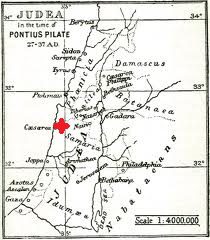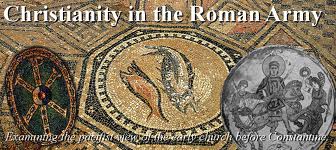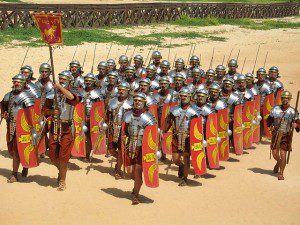Acts 10 At Caesarea there was a man named Cornelius, a centurion of what was known as the Italian Cohort, 2 a devout man who feared God with all his household, gave alms generously to the people, and prayed continually to God.
 Don’t miss this: Caesarea is the administrative capital and military outpost of the Roman Empire by which Rome ruled, taxed and maintained civil order in Judea and Idumea.
Don’t miss this: Caesarea is the administrative capital and military outpost of the Roman Empire by which Rome ruled, taxed and maintained civil order in Judea and Idumea.
Cornelius is a centurion – a Roman soldier, part of the Italian Cohort sent across the Great Sea (Mediterranean) to maintain the claim of Rome in these foreign colonies; much as the Spanish, English and other empires have done in more recent centuries.
We recognize that Jesus was Messiah to the Jews and preached to Jewish converts from other nations. We recognize that Jesus also taught in other areas – gentile towns – clearly with little or no connection to Judea or long-ago destroyed Israel.
We may have missed (until the missionary journeys of Paul) that Romans, as occupying residents of the Land of Promise, were witness to the Gospel.
Acts 10:3 About the ninth hour of the day he saw clearly in a vision an angel of God come in and say to him, “Cornelius.” 4 And he stared at him in terror and said, “What is it, Lord?”
And he said to him, “Your prayers and your alms have ascended as a memorial before God. 5 And now send men to Joppa and bring one Simon who is called Peter. 6 He is lodging with one Simon, a tanner, whose house is by the sea.” 7 When the angel who spoke to him had departed, he called two of his servants and a devout soldier from among those who attended him, 8 and having related everything to them, he sent them to Joppa.
How does it happen that a Roman is witness to the Gospel of Jesus Christ?
Again, it’s just like you or me at work: we probably didn’t see that ‘Roman’ right there beside us (doing their own job) as we were witness to all of the truth of our faith.
Let’s focus on some Romans (other than Pontius Pilate) at the spectacle of the Crucifixion of Christ Jesus on the Cross in Jerusalem some months earlier than this scene with Cornelius.
Luke 23: Then the whole company of them arose and brought him before Pilate. 2 And they began to accuse him, saying, “We found this man misleading our nation and forbidding us to give tribute to Caesar, and saying that he himself is Christ, a king.” 3 And Pilate asked him, “Are you the King of the Jews?” And he answered him, “You have said so.”
Were there Roman Centurions present in this scene with the potential for an uprising against Roman authority? Or course; many Roman soldiers.
20 Pilate addressed them once more, desiring to release Jesus, 21 but they kept shouting, “Crucify, crucify him!” 22 A third time he said to them, “Why, what evil has he done? I have found in him no guilt deserving death. I will therefore punish and release him.” 23 But they were urgent, demanding with loud cries that he should be crucified. And their voices prevailed. 24 So Pilate decided that their demand should be granted. 25 He released the man who had been thrown into prison for insurrection and murder, for whom they asked, but he delivered Jesus over to their will.
Were Roman Centurions present? Yes, and the crowd is growing even more unruly. They continue to do as ordered (even though the Roman ruler of the occupied territory has declared this man ‘innocent.’) How can he do that? Yet orders are orders.
27 And there followed him a great multitude of the people and of women who were mourning and lamenting for him. 28 But turning to them Jesus said, “Daughters of Jerusalem, do not weep for me, but weep for yourselves and for your children.
A military escort for the condemned criminals through the crowds of Jerusalem? SOP – (Standard Operating Procedure).
33 And when they came to the place that is called The Skull, there they crucified him, and the criminals, one on his right and one on his left. 34 And Jesus said, “Father, forgive them, for they know not what they do.”
The soldiers cast lots to see who would win his clothes. (A rather macabre occupation of time for executioners to be distracted from the cries of dying men.)
44 It was now about the sixth hour, and there was darkness over the whole land until the ninth hour, 45 while the sun’s light failed.
A foreboding storm covers the scene of the skull of death (as it was known). Are the Roman Legions fearful?
Would you be fearful? … Probably.
46 Then Jesus, calling out with a loud voice, said, “Father, into your hands I commit my spirit!”
And having said this he breathed his last.
47 Now when the centurion saw what had taken place, he praised God, saying, “Certainly this man was innocent!”
48 And all the crowds that had assembled for this spectacle, when they saw what had taken place, returned home beating their breasts.
What who you (as the Centurion) think of the witness of this spectacle?
Just one more additional thought (which I mentioned in an earlier writing about the Sermon on the Mount):
Do you think that Jesus (or anyone) could gather 5000 people or 4000 people or multitudes together to witness His teaching and witness His miracles and witness the truth of His daily life without Roman Centurians also being present?
Not likely.
We witness the gospel to any the Lord also sends to the places we live, work, play, travel and worship.
What is your witness of the Gospel to the Romans guarding over you (who you rarely notice)?



Leave a Reply